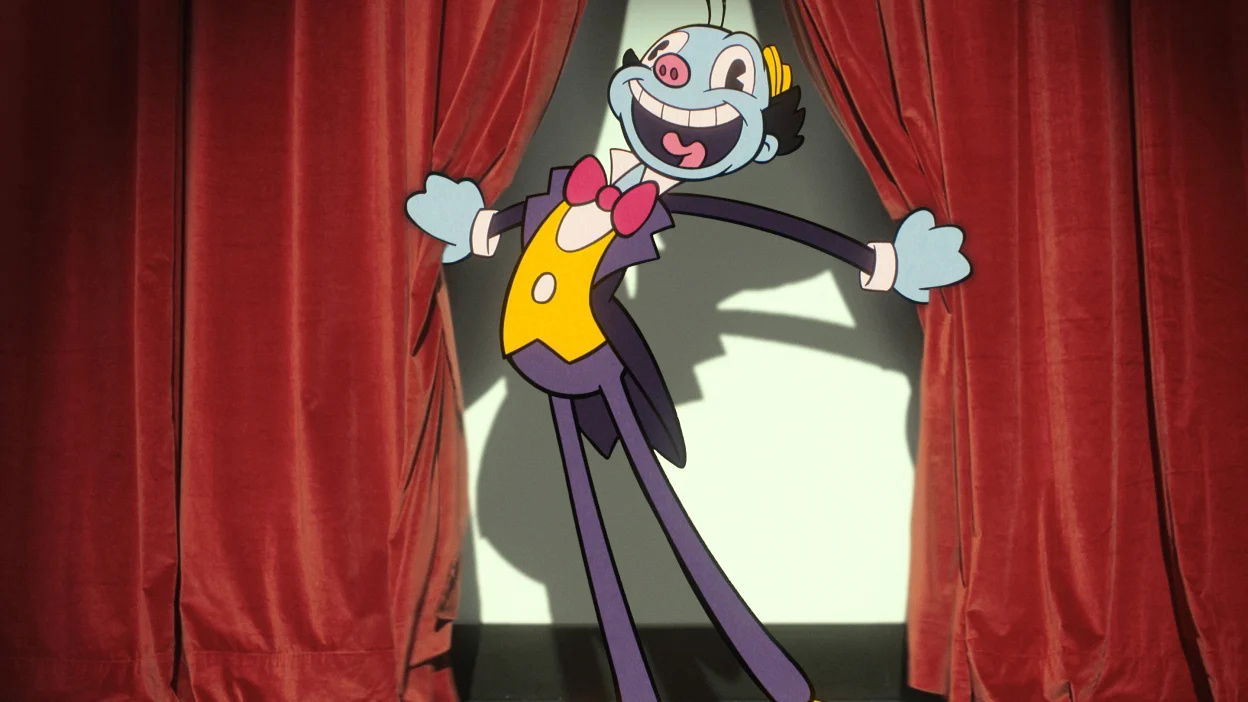
When you’re watching a TV show that continually lets you down, there are moments when you want to keep ‘giving it a chance,’ and others when you start wondering if ‘your faith will ever be rewarded.’ After an incredibly lackluster season premiere, Doctor Who had a lot to make up for, and I know I’m not alone in feeling that way.
The problem, as my Doctor Who Lux review will show, is that despite an incredibly unique premise—even for this show—Russell T. Davies instead chose to ‘poke fun at fans’ while getting as ‘meta as possible.’ Unfortunately, the episode floundered because of it.
Immediately following the events of the last episode, The Doctor sets out to find a way to return his new companion, Belinda, back home. To do so, he decides they need to gather ‘more data’ and sends them back to Miami in 1952. I’ll address that ‘randomness’ later, but the key detail here is that, during this particular time, an ‘incident’ occurs at a movie theater. A cartoon character, Mr. Ring-A-Ding-Ding, seemingly comes to life and does something to the 15 people present. Naturally, The Doctor wants to investigate—and that’s where we encounter the first of many surprises, as this character turns out to be…
…one of the gods from the ‘Pantheon of Discord,’ which The Doctor has been battling since the 60th anniversary special. To be honest, it was a letdown—yet another god defeated within a single episode, rather than being built up as a genuine threat. The disappointment deepened when Lux, the god of light, proved to be a far lesser menace compared to Maestro, who literally robbed the world of music, or Suketh, who killed the whole universe!
Lux had the ability to trap people in film…but only those inside the theater. Even with his ‘godly powers,’ his sluggish movements, stemming from his size, undermined any sense of urgency. Then we learn he needed light to grow stronger, yet somehow wasn’t powerful enough to step outside and absorb more light. I’ll touch on that ‘twist’ later.
Another notable issue was Belinda. As I mentioned in my previous review, her lack of consistent personality continues to be a problem. At the end of the last episode, she demanded The Doctor take her home, yet the moment she discovered ‘1952 was right out the door,’ she couldn’t wait to explore. Sure, she ‘snapped back,’ but only briefly before becoming confused and eager to ‘Scooby-Doo this crap’—borrowing a phrase from another doctor. Then there’s the moment when she seemingly ‘didn’t trust The Doctor,’ only to suddenly apologize for not trusting him—a trope-heavy moment that cinema wouldn’t exactly celebrate.
Russell T. Davies couldn’t resist leaning heavily into the ‘cinema’ theme of this episode, layering it with meta commentary on the kind of ‘case’ they were solving (with the Scooby-Doo references), showcasing different animation styles to ‘add depth to characters,’ and, of course, directly addressing ‘the fans.’
Now, on their own, these elements wouldn’t have been bad. However, much like other episodes I’ve mentioned recently, Davies seems intent on ignoring ‘true emotional storytelling’ in favor of simply pushing the plot forward. For example, in the above reference image, the only way The Doctor and Belinda could ‘regain their depth’ was by adding sad feelings they were experiencing. How does that even work? Plus, this emotional thread was completely abandoned once they became three-dimensional again. Belinda gave a one-line reminder about it, and then they were back in the TARDIS.
As for the ‘fans,’ the meta commentary was downright confusing. They ‘were real’ and knew all about The Doctor’s adventures, but they weren’t real and were apparently going to ‘die’ at the end…except they didn’t. And if they weren’t real, how did they have knowledge of past adventures like ‘Blink?’ It’s a baffling scenario. On top of that, Davies seemed to be gloating, with all the fans being depicted as preferring ‘Blink’ above everything else. It felt as though he were mocking fans at times—especially during the end credits sequence, where they rated the episode a ‘7/10,’ clearly poking fun at those who ‘don’t like his episodes anymore,’ which, let’s be honest, has been a recurring complaint.
The climax was equally baffling. Lux wanted to go outside and was content to steal Time Lord energy (which, conveniently, The Doctor had been ‘storing’ since the 60th anniversary—really?) to gain a new form. But then, when the sun came out, Lux became ‘everything and nothing.’ Excuse me, what? This means Lux was doomed from the start, making him the worst god ever! Yes, Maestro was defeated by sound, but it required a specific set of notes to be played, and even The Doctor initially got the notes wrong. The Toymaker had to be beaten in a game, and that wasn’t guaranteed. Suketh had to be dragged through space and time to undo his effects. But Lux? Defeated…by sunlight. Really?
Another glaring flaw in logic, which many have pointed out, is the issue surrounding May 24th being ‘off limits.’ Why not go back to May 23rd in a location The Doctor knows he isn’t in (thus avoiding a paradox) and investigate what happened then? After all, he kept repeating the date they ‘can’t go to,’ so why not try the day before? That’s just simple logic—and logic is what The Doctor excels at when solving problems. Except, apparently, not this time.
One last point: yet again, Davies chose not to engage with the ‘real-world issues’ of the period The Doctor was visiting. While racism in 1950s Miami was mentioned a few times, it ultimately led to nothing substantial. It felt more like a ‘Yeah, we know this was a real thing, but it doesn’t matter right now’ approach. And when they did try to ‘make a big deal out of it,’ the scene turned out to be fake, which was frustrating.
Oh, and Mrs. Flood showing up again? Really? Are we heading toward another ‘Susan Twist’ situation? It doesn’t feel worth it, especially considering how things played out last time.
As I wrap up my Doctor Who Lux review, I want to reiterate that I don’t hate this show. I know it can be truly special when it wants to be. But now, with two episodes into this season, I find myself completely uninterested in what’s to come—and that makes me genuinely sad.
You can watch Doctor Who on Disney+ and Hulu in the United States
Doctor Who Lux Review
Doctor Who “Lux” tried to get very creative with its villain and setting, and it ALMOST worked, but the show’s writing for both Belinda, the villain, and the “fans” helped make this feel like Russell T. Davies was “tooting his own horn” versus trying to make a compelling episode.
Pros
- Mr. Ring-A-Ding-Ding was unique…
- Clever story setup…
Cons
- …but went out like a bad joke.
- …that fell apart because of the “fans” and meta-style storytelling.
- Belinda’s “whiplash” personality.
- Mrs. Flood.
- Misuse Of Serious Story Themes Again
-
Doctor Who Lux Review





